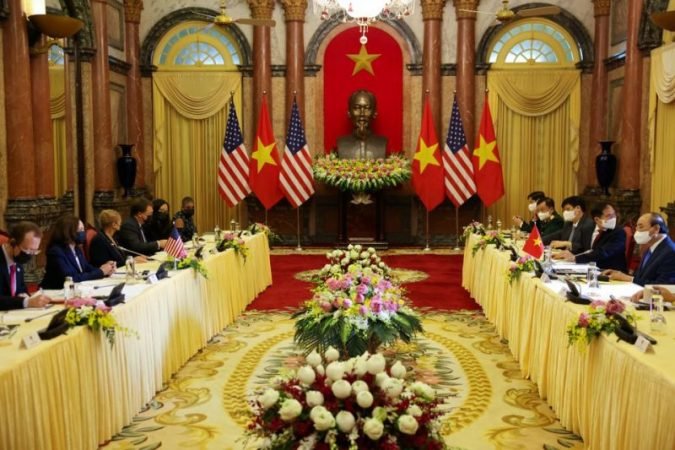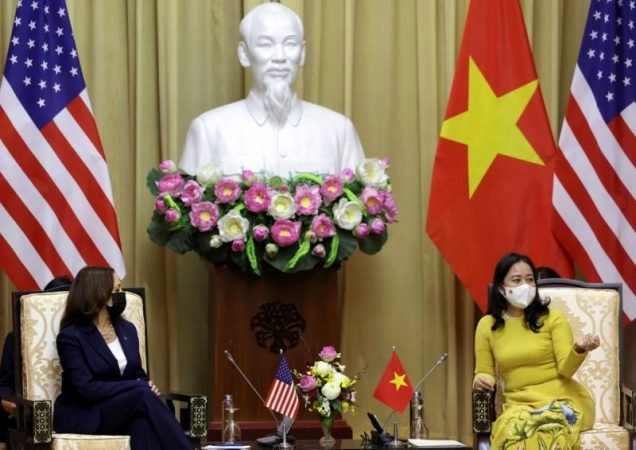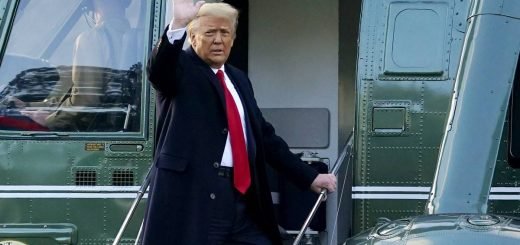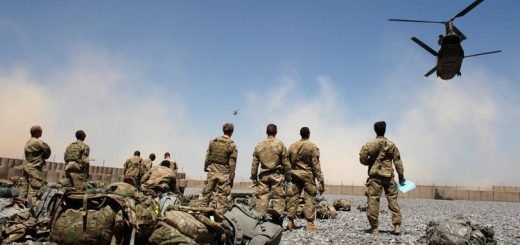U.S., China accuse each other of “bullying” nations

U.S. Vice President Kamala Harris on Wednesday again charged China with bullying its Southeast Asian neighbours, the second time in two days she has attacked Beijing during a regional visit aimed at countering China’s growing influence.
Earlier on Wednesday, Chinese state media accused Harris of seeking to drive a wedge between China and Southeast Asian nations with comments in Singapore that Beijing used coercion and intimidation to back its unlawful South China Sea claims.
Speaking in Hanoi on Wednesday, Harris said there was a need to increase pressure on Beijing over its maritime claims.
“We need to find ways to pressure, raise the pressure…on Beijing to abide by the United Nations Convention on the Law of the Sea, and to challenge, its bullying and excessive maritime claims,” said Harris during a meeting with Vietnamese President Nguyen Xuan Phuc.
China, Vietnam, Brunei, Malaysia, the Philippines and Taiwan, lay claim to parts of the South China Sea, which is crossed by vital shipping lanes and contains gas fields and rich fishing grounds.
China has established military outposts on artificial islands in the South China Sea and objects to foreign warships sailing through what it claims is its sovereign waters.
The U.S. Navy regularly conducts “freedom of navigation” operations through the disputed waters, which China objects to, saying they do not help promote peace or stability.
In 2016, the Hague-based Permanent Court of Arbitration ruled against China’s claim, but Beijing has rejected the ruling.
“While pointing a finger at China and accusing it of ‘coercion’ and ‘intimidation’, Harris willfully ignored her own hypocrisy in attempting to coerce and intimidate regional countries to join Washington in its scheme to contain China,” the state run China Daily said in an editorial responding to Harris’s comments in Singapore.
Harris’s Singapore speech was a baseless attack on China, the editorial said. “It seems that the United States’ only commitment to Southeast Asia is its dedicated efforts to drive a wedge between the Southeast Asian nations and China,” it added.
In Hanoi, Harris met with Vietnam’s top leaders and offered support in several key areas, including the enhancement of its maritime security and more U.S. Navy ship visits to Vietnam.

The U.S. administration has called rivalry with China “the biggest geopolitical test” of the century and Southeast Asia has seen a series of high-profile visits by top administration officials, including Secretary of Defense Lloyd Austin, who visited Hanoi in late July.
Harris’s arrival in Hanoi was delayed on Tuesday after the U.S. Embassy in Vietnam said it had detected an “anomalous health incident”, potentially related to the mysterious Havana Syndrome.
During the delay, Vietnam’s Prime Minister Pham Minh Chinh and China’s ambassador to Vietnam held a previously unannounced meeting, during which Chinh said Vietnam does not take sides in foreign policy. The Chinese ambassador promised a donation of 2 million COVID-19 vaccines during the meeting.
China is Vietnam’s largest trading partner and Vietnam is heavily reliant on materials and equipment from China for its manufacturing activities.
Their ruling Communist Parties maintain close ties, but Vietnam and China have been embroiled in a longstanding dispute over maritime claims in the South China Sea, known as the East Sea in Vietnam.
The tensions have propelled Vietnam into being one of the most vocal opponents of Beijing’s claims in the disputed waterway and Hanoi has received U.S. military hardware, including coastguard cutters.
Ties between Hanoi and Washington have grown closer more than four decades after the Vietnam War ended in 1975, although Washington has said there are limits to the relationship until Hanoi makes progress on human rights.
Analysts say Vietnam wants to upgrade its diplomatic relationship with the United States to a “strategic partnership” but is concerned such a move would anger Beijing.
Reporting by Nandita Bose and James Pearson in Hanoi and David Stanway in Shanghai; Editing by Michael Perry



















